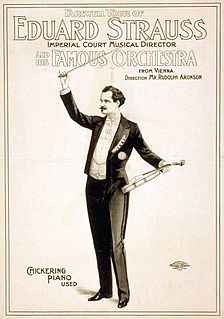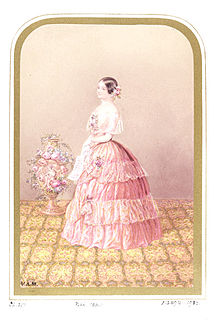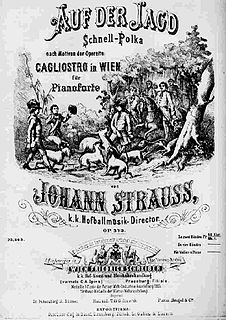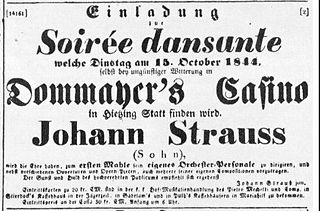Related Research Articles

Johann Strauss II, also known as Johann Strauss Jr., the Younger, the Son, was an Austrian composer of light music, particularly dance music and operettas. He composed over 500 waltzes, polkas, quadrilles, and other types of dance music, as well as several operettas and a ballet. In his lifetime, he was known as "The Waltz King", and was largely responsible for the popularity of the waltz in Vienna during the 19th century. Some of Johann Strauss's most famous works include "The Blue Danube", "Kaiser-Walzer", "Tales from the Vienna Woods", and the "Tritsch-Tratsch-Polka". Among his operettas, Die Fledermaus and Der Zigeunerbaron are the best known.

Johann Strauss I was an Austrian Romantic composer. He was famous for his waltzes, and he popularized them alongside Joseph Lanner, thereby setting the foundations for his sons to carry on his musical dynasty. He is best known for his composition of the Radetzky March.

Franz Josef Strauss was a German politician. He was the long-time chairman of the Christian Social Union in Bavaria (CSU) from 1961 until 1988, member of the federal cabinet in different positions between 1953 and 1969 and minister-president of the state of Bavaria from 1978 until 1988. Strauss is also credited as a co-founder of European aerospace conglomerate Airbus.

Josef Strauss was an Austrian composer.

Levi Strauss & Co. is an American clothing company known worldwide for its Levi's brand of denim jeans. It was founded in May 1853 when German immigrant Levi Strauss moved from Buttenheim, Bavaria, to San Francisco, California to open a west coast branch of his brothers' New York dry goods business. The company's corporate headquarters is located in Levi's Plaza in San Francisco.

Eduard "Edi" Strauss was an Austrian composer who, together with his brothers Johann Strauss II and Josef Strauss made up the Strauss musical dynasty. He was the son of Johann Strauss I and Maria Anna Streim. The family dominated the Viennese light music world for decades, creating many waltzes and polkas for many Austrian nobility as well as dance-music enthusiasts around Europe. He was affectionately known in his family as 'Edi'.

Henrietta "Jetty" Treffz was best known as the first wife of Johann Strauss II and a well-known mezzo-soprano appearing in England in 1849 to great acclaim.

Waltzes from Vienna is a 1934 British biographical film directed by Alfred Hitchcock, sometimes known as Strauss' Great Waltz. It was part of the cycle of operetta films made in Britain during the 1930s.

Dominique Gaston André Strauss-Kahn is a French economist, politician, former managing director of the International Monetary Fund (IMF), and a figure in the French Socialist Party who attained notoriety due to his involvement in several financial and sexual scandals. He is often referred to in the media, and by himself, by his initials DSK. Strauss-Kahn was appointed managing director of the IMF on 28 September 2007, with the backing of then–President of France Nicolas Sarkozy. He served in that capacity until his resignation on 18 May 2011, in the wake of an allegation that he had sexually assaulted a hotel maid. Other allegations followed, but he was acquitted.

Neil Darrow Strauss, also known by the pen names Style and Chris Powles, is an American author, journalist and ghostwriter. He is best known for his book The Game: Penetrating the Secret Society of Pickup Artists, in which he describes his experiences in the seduction community in an effort to become a "pick-up artist." He is a contributing editor at Rolling Stone and also wrote regularly for The New York Times.
Sträußchen (Bouquets), op. 15, is a waltz composed by Johann Strauss II in July 1845. It was first performed at the first ball held in the newly renovated 'Zum goldenen Strauss' ballroom in the buildings of the Theater in der Josefstadt in Vienna.
Lob der Frauen, Op. 315, is a polka-mazurka composed by Johann Strauss II. The composition was first performed at the Vienna Volksgarten at the 1867 Carnival in Vienna. The work was performed alongside other compositions that Strauss had written around that period, including the famous waltzes Blue Danube and Artist's Life.
Neue Pizzicato Polka, Op. 449, is a polka composed by Johann Strauss II. It was written in 1892 for concerts to be given under Eduard Strauss in Hamburg. Strauss later inserted the work as a ballet between the second and third acts of his operetta Fürstin Ninetta.
Bitte schön!, opus 372, is a polka composed by Johann Strauss II. The first two themes of the composition incorporate Strauss' operetta Cagliostro in Wien. The composition was first performed in the summer of 1872.

"Auf der Jagd", op. 373, is a polka composed by Johann Strauss II. The composition is based on melodies in Strauss' operetta Cagliostro in Wien.

Gunstwerber, Op. 4, is a waltz by Johann Strauss II.

Herzenslust, Op. 3, is a polka composed by Johann Strauss II in the fall of 1844 for his debut as a composer at the Dommayer's Casino establishment in Vienna. It was performed along with several of Strauss' other early compositions, such as the waltzes Sinngedichte and Gunstwerber, and the Debut-Quadrille. Reviewing Strauss' debut, the journal Der Wanderer noted that both the Debut-Quadrille and the Herzenslust Polka "are so piquant in their inspiration, and handled with such glittering effect in the instrumentation that we […] have to recognise and commend the bold and exuberant talent of Strauss Son."
Carnevalsbilder, opus 357, is a waltz composed by Johann Strauss II. The waltz is based on melodies from Strauss' operetta Der Karneval in Rom. Strauss conducted its first performance in Vienna on July 9 1873. Oscar Straus later arranged the second waltz theme of Carnevalsbilder for his operetta Drei Walzer as the soprano aria Ich liebe das Leben.

Debut-Quadrille, Op. 2, is a quadrille composed by Johann Strauss II. It was one of four compositions that Strauss had written for his début as a composer at the Dommayer's Casino in Hietzing, Vienna in the fall of 1844. The composition is in standard Viennese quadrille form, with six sections, named: No. 1 Pantalon; No. 2 Été; No. 3 Poule; No. 4 Trénis; No. 5 Pastourelle; No. 6 Finale.
Waldine, Op. 385, is a polka-mazurka composed by Johann Strauss II. The title is taken from one of Strauss' operettas, Blindekuh. Waldine was the last, as well as the least successful, of the five orchestral dance compositions that Strauss had arranged on tunes from the operetta, having been first performed an entire year after the premiere of the operetta, where it was conducted by Eduard Strauss in the Musikverein in Vienna on December 7, 1879.
References
- ↑ "STRAUSS II, J.: 100 Most Famous Works, Vol. 8 CD". NaxosDirect. Archived from the original on 14 July 2011. Retrieved 12 October 2008.
| | This article about a classical composition is a stub. You can help Wikipedia by expanding it. |